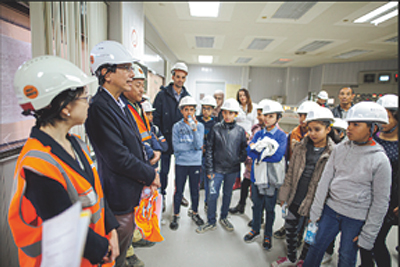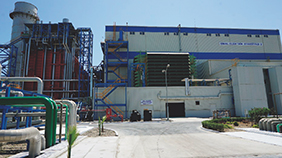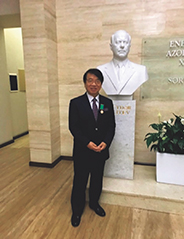(9) Securing Access to Resources and Energy
The number of people without access to electricity is estimated at approximately 790 million in the world and more than approximately one in two people in Sub-Saharan Africa as of 2018. In 2030, it is estimated that approximately 2.3 billion people globally will not have access to clean cooking fuels and technology (electricity, LPG, natural gas, etc.), and the accompanying indoor air pollution is one of the factors of premature death. The lack of electricity, gas, and other energy supplies also leads to many issues, such as the delay in industrial development, a loss of employment opportunities, and a further increase in poverty. Stable energy supply and appropriate consideration to the environment are essential since the global energy demand is expected to increase further, mainly in emerging and developing countries, particularly in Asia.
●Japan’s Efforts

Personnel from a Japanese company giving an explanation to local elementary school students about the construction of a combined cycle (gas-fired) power plant facility at the Rades power plant in Tunisia
In order to realize sustainable development in developing countries, Japan works on the provision of services which enable modern energy supply and the stable supply of electricity for industrial development. In addition, Japan provides support for the establishment of an environmentally friendly infrastructure (socio-economic infrastructure), such as the construction of energy-saving equipment and power generation facilities that utilize renewable energy (hydropower, solar photovoltaics, solar thermal, wind power, geothermal power, etc.). For example, Japan is providing assistance for the construction and rehabilitation of geothermal power plants in the Olkaria geothermal field in Kenya, utilizing ODA loans for clean and stable power supply regardless of weather, which contributes to a total of approximately 400 MW of power generation. Moreover, in Pacific Island countries with limited and scattered land, which are vulnerable to the influence of climate change, Japan, under the “hybrid island concept,” is providing assistance to mainstream grid-connected type renewable energy from the perspective of energy security and the realization of a low-carbon or decarbonized society. At the Pacific Climate Change Center built through Japan’s assistance in Samoa, Japan is also focusing on developing human resources in the area of climate change countermeasures in the Pacific Island region.
Japan also supports the Extractive Industries Transparency Initiative (EITI), which is a multinational cooperative framework to increase the transparency of the money flow in the development of oil, gas, mineral, and other resources. Under this framework, extracting corporations report the amount of payment to the governments of resource-producing countries, and the governments of resource-producing countries also report the amount of the revenue from extracting corporations to the EITI. In addition to 47 resource-producing countries and many supporting countries including Japan, extracting companies and NGOs are participating in the EITI, and by ensuring transparency of the money flow, are working together to prevent corruption and conflict, as well as to encourage responsible resource development that leads to growth and poverty reduction.
Azerbaijan
(1) Severnaya* Gas Combined Cycle Power Plant Project,
(2) Shimal Gas Combined Cycle Power Plant Project (Second Unit)
Loan Aid (ODA Loan) ((1) February 1998 – October 2003, (2) May 2005 – September 2019)

The Shimal Gas Combined Cycle Power Plant’s second unit (Photo: JICA)

Mr. Sato, who was awarded the Progress Medal by the President of Azerbaijan (Photo: JICA)
Azerbaijan, which faces the Caspian Sea, is blessed with abundant natural resources such as oil and natural gas. However, after gaining independence from the Soviet Union in 1991, the surge in demand for electricity for general household use as well as industrial use by the country’s rapid economic growth meant that the deteriorating power generation facilities constructed in the Soviet era could not meet electricity demand. In particular, aging power generation facilities and power lines that had been in continuous use since the 1980s were a serious problem.
To overcome this situation, through the implementation of this project, Japan has supported the construction of first and second generator units at the Shimal Gas Combined Cycle Power Plant in the eastern region of Azerbaijan, where electricity demand is concentrated. The combined output of these two units accounts for approximately 10% of Azerbaijan’s power generation capacity. By introducing the country’s first advanced power generation facilities with high thermal efficiency, this project has made a significant contribution to alleviating power shortages and achieving sustainable economic growth. In addition, it has also been contributing to the sustained and stable supply of electricity across the country’s entire power network.
The completion of these two power generation facilities was made possible by the dedicated efforts of Mr. SATO Mitsuyuki of Tokyo Electric Power Services Co., Ltd., who worked on the project from design to completion for over 25 years. Although it was uncertain at times as to whether the project would be completed due to financial difficulties and other problems on the Azerbaijani side, Mr. Sato worked hard to complete the project, negotiating with the staff of the implementing organization and discussing ways on how to proceed with the construction. As a result, it was possible to hold the opening ceremony for the second unit in September 2019. Mr. Sato’s achievements were highly praised by the Government of Azerbaijan, and in December 2019, he was awarded the Progress Medal by the President of the country, which is presented to those who have made distinguished contributions in the energy sector.
The effort and dedication shown by the Japanese staff, including Mr. Sato, exemplify the significant contribution that Japan has made to Azerbaijan’s development, as well as to the promotion of friendly relations between Japan and Azerbaijan.
*The power plant is currently called “Shimal” in Azerbaijani, not “Severnaya.”
